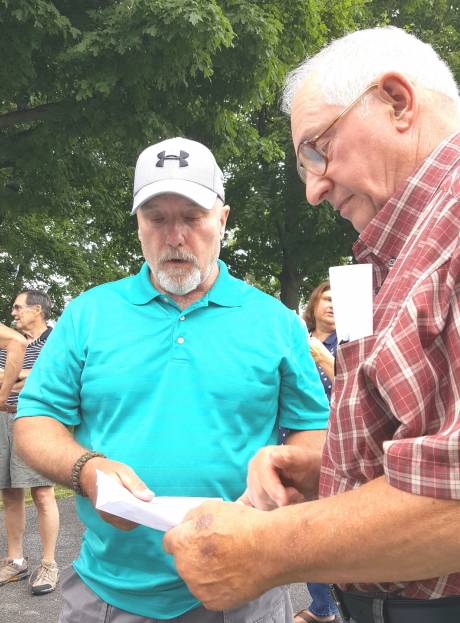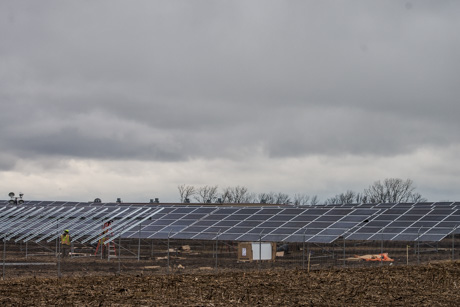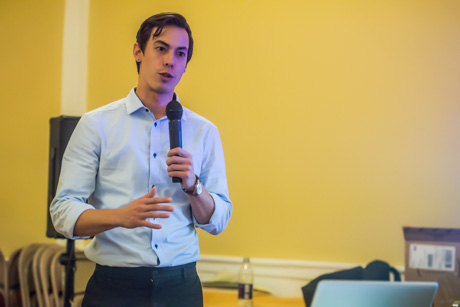'Unknowns' have Ellicott Street Road residents wary of dairy farmer's solar farm proposal

A plan to build a 5-megawatt solar farm on Ellicott Street Road in the Town of Batavia is not sitting well with area residents, who shared their views with the property owner at a neighborhood meeting on Friday night.
About 25 people gathered at the home of Bill and Nancy Brach at 5168 Ellicott Street Road to discuss the pros and cons of solar farms in general and to gain information about the specific project proposed by Donald Partridge, owner of a large dairy farm on that road.
“To be honest, probably some of us would like to see if there’s any way to keep this particular project from taking place,” Nancy Brach said.
She was referring to Partridge’s application to put a 36-acre solar farm on land located at 5103 Ellicott Street Road, about a half-mile southeast of Shepard Road – on the left-hand side as you head out of Batavia toward East Bethany.
Brach cited concerns over adverse health effects, proximity to residences, unattractive appearance, negative effect on property values and taxpayer subsidies in her opening statement to the group.
Currently, Partridge’s proposal is on hold since it was denied by the Town Zoning Board of Appeals for being over the maximum size allowed (20 acres). It could be resubmitted, however, if it were modified to show two separate 20-acre parcels or if the ZBA were to reconsider its decision on a variance.
To his credit, Partridge (and his wife, Pat) attended the meeting and stood his ground. And to his neighbors’ credit, the meeting progressed in a respectful, civil manner.
Partridge said that he proposed one 36-acre solar farm instead of two 20-acre units to eliminate the need for two sets of poles and other hardware. He also said that he moved it back from its original location.
“We sought a variance to make it more efficient and when (Trousdale Solar) engineers came back to me with the first design, it was tight up to Folger’s pine trees,” he said.
The proposed site is about 150 feet from the property line of Richard and Jolene Folger at 5105 Ellicott Street Road.
It also is within the sight line of the property of Steve and Mary Smith at 5107 Ellicott Street Road and is not far away from an ARC of Genesee Orleans group home down the road.
While Partridge said his goal was to be “less intrusive to everybody,” that apparently isn’t enough to convince the Smiths and the Folgers.
“We’re concerned about the safety of these solar farms, especially being near residents,” Mary Smith, mentioning the need for “filters” and the possibility of stray voltage.
“It’s not so much about useable energy; what are the effects of this electricity on individuals?” her husband added.
Folger said he needs more accurate data to make an informed decision.
“My biggest objection is that there are too many unknowns,” he said. “How does it affect people’s health and property values? And the Town doesn’t have a handle on setbacks (believed to be 50 feet from a neighboring property).”
Partridge, a member of the Batavia Town Planning Board, acknowledged that he will make a “super income” from the project, much more than he would make if he farmed the land.
He added that he would make sure the soil quality would be retained and is committed to green energy, noting that he has three private windmills on his farm.
“Our resources are limited – gas, oil and coal – and someday will run out,” he said.
The neighbors also voiced their displeasure with the way the Town communicates with area residents when projects such as these pop up.
“We feel the Town was a bit underhanded in notifying us (prior to board meetings). It was a last minute thing,” said Kathy Antonelli, of 5061 Ellicott Street Road, who has been assisting Nancy Brach in this effort.
Toward the end of the meeting, Mary Smith provided Partridge with a ray of hope.
“If you would consider moving it (the solar farm) back a ways (from the road), we would be very grateful,” she said.
Photo: Donald Partridge, right, and Steve Smith look at a map of the site of a 36-acre solar farm being proposed by Partridge on Ellicott Street Road. Photo by Mike Pettinella.


